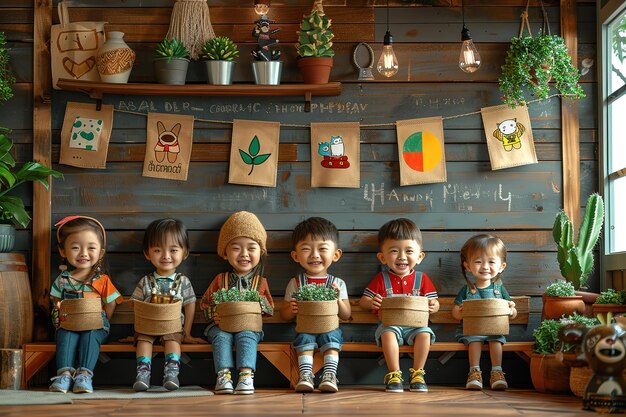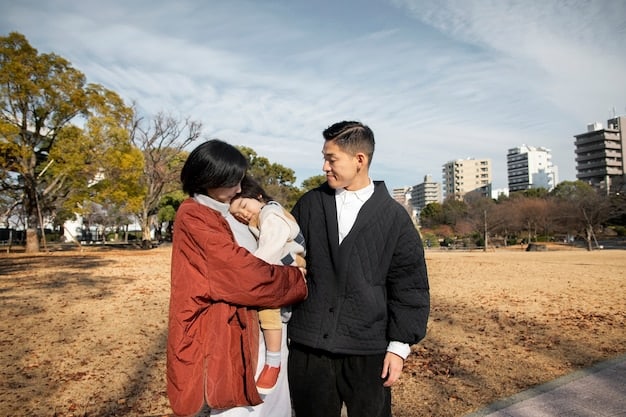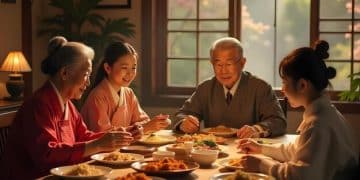Korean Parenting Styles: Lessons for American Parents in 2025

Korean parenting styles, known for their emphasis on education, respect, and strong family bonds, offer valuable insights for American parents seeking to foster resilience, academic success, and close-knit relationships with their children in 2025.
What can American parents learn from Korean parenting styles in 2025? With a focus on academic excellence, respect for elders, and a deep sense of family, Korean parenting offers unique strategies that can be adapted to the American context. Let’s explore the key principles and practical applications of Korean parenting styles: What American Parents Can Learn in 2025.
Understanding Korean Parenting Styles
Korean parenting, often rooted in Confucian values, emphasizes diligence, respect, and academic achievement. Understanding the core tenets of this approach is crucial for American parents seeking to incorporate beneficial aspects into their own parenting strategies. Korean culture places a high value on education and filial piety, shaping parenting practices in distinct ways.
The Influence of Confucianism
Confucianism plays a significant role in Korean parenting, instilling values such as respect for elders, the importance of education, and the pursuit of harmony within the family unit. This philosophical underpinning shapes the expectations and behaviors of both parents and children.
Emphasis on Education
Education is highly valued in Korean society, and parents often invest significant time and resources to ensure their children excel academically. This commitment to learning begins at an early age, with many children participating in extracurricular activities and tutoring programs.

- Early Childhood Education: Korean parents often prioritize early childhood education to provide their children with a strong foundation for future academic success.
- Structured Learning Environment: Many Korean households create a structured learning environment that supports academic achievement and fosters a disciplined approach to studying.
- Extracurricular Activities: Participation in extracurricular activities, such as music lessons or language classes, is common among Korean children, enhancing their skills and broadening their horizons.
- Parental Involvement: Korean parents are actively involved in their children’s education, providing support, encouragement, and guidance to help them reach their full potential.
In summary, Korean parenting is deeply influenced by Confucian values and a strong emphasis on education. These cultural underpinnings shape parenting practices that prioritize respect, diligence, and academic achievement, offering valuable lessons for American parents looking to enhance their approach to raising children.
Key Differences Between Korean and American Parenting
While both Korean and American parents share the goal of raising happy and successful children, their approaches to parenting differ in several key aspects. Understanding these differences can provide American parents with a broader perspective on child-rearing.
Collectivism vs. Individualism
Korean parenting tends to be more collectivist, emphasizing the importance of family and community, while American parenting often leans towards individualism, encouraging independence and self-reliance. This fundamental difference shapes the values and expectations instilled in children.
Discipline and Expectations
Korean parents may employ stricter disciplinary measures and set higher academic expectations compared to their American counterparts. This approach is often rooted in the belief that discipline and hard work are essential for achieving success.

Communication Styles
Communication styles can also differ, with Korean parents sometimes adopting a more authoritative approach, while American parents often prioritize open communication and negotiation with their children. Understanding these cultural nuances is crucial for effective cross-cultural communication.
- Emphasis on Respect: Korean parenting places a strong emphasis on respecting elders and authority figures, fostering a sense of deference and obedience in children.
- Independence vs. Interdependence: American parenting often emphasizes independence and self-reliance, while Korean parenting promotes interdependence and a strong sense of family obligation.
- Academic Pressure: Korean children may face greater academic pressure compared to their American peers, reflecting the high value placed on education in Korean society.
In conclusion, Korean and American parenting styles differ significantly in their approaches to collectivism vs. individualism, discipline, expectations, and communication styles. By understanding these key differences, American parents can gain valuable insights into alternative parenting strategies and adapt them to their own cultural context.
The “Tiger Mom” Stereotype: Fact vs. Fiction
The “tiger mom” stereotype, often associated with Asian parenting, has gained considerable attention in recent years. However, it’s essential to distinguish between the stereotype and the diverse reality of Korean parenting practices. While some Korean parents may exhibit tiger mom characteristics, this is not representative of all.
Origins of the Stereotype
The “tiger mom” stereotype originated from Amy Chua’s book, “Battle Hymn of the Tiger Mother,” which described her strict and demanding parenting style. While the book sparked debate, it also perpetuated a narrow and often inaccurate portrayal of Asian parenting.
Challenging the Stereotype
Many Korean parents do not fit the “tiger mom” mold, and their parenting styles are more nuanced and balanced. They may prioritize academic achievement but also value their children’s emotional well-being and personal growth.
The Importance of Cultural Context
It’s crucial to consider the cultural context when evaluating Korean parenting styles. Values such as diligence, respect, and family obligation play a significant role in shaping parenting practices, and these should not be misconstrued as solely driven by a desire for academic success.
In summary, the “tiger mom” stereotype is a simplification of the diverse reality of Korean parenting. While some parents may exhibit tiger mom characteristics, it is not representative of all Korean parents, and it’s essential to consider the cultural context when evaluating their parenting practices.
Positive Aspects of Korean Parenting
Despite some potential drawbacks, Korean parenting offers several positive aspects that can benefit children. These include a strong emphasis on education, respect for elders, and a deep sense of family. By incorporating these elements, American parents can enhance their own parenting strategies.
Fostering Academic Excellence
The emphasis on education in Korean parenting can foster a strong work ethic and a lifelong love of learning in children. By providing a supportive and structured learning environment, parents can help their children reach their full academic potential.
Instilling Respect and Responsibility
Korean parenting often instills a sense of respect for elders and authority figures, as well as a strong sense of responsibility towards family and community. These values can help children develop into well-rounded and responsible adults.
Building Strong Family Bonds
The focus on family in Korean parenting can create strong family bonds and a sense of belonging. By prioritizing family time and fostering open communication, parents can build lasting relationships with their children.
In conclusion, Korean parenting offers several positive aspects, including fostering academic excellence, instilling respect and responsibility, and building strong family bonds. By incorporating these elements into their own parenting strategies, American parents can enhance their approach to raising children.
Potential Drawbacks and Criticisms
While Korean parenting has many positive aspects, it also faces certain criticisms. These include potential for excessive academic pressure, limited opportunities for independent exploration, and the risk of hindering creativity and critical thinking. American parents should be aware of these potential drawbacks when considering adopting Korean parenting strategies.
Excessive Academic Pressure
The emphasis on academic achievement in Korean parenting can sometimes lead to excessive pressure on children, potentially causing stress, anxiety, and burnout. It’s essential for parents to strike a balance between academic expectations and their children’s emotional well-being.
Limited Independence
The collectivist nature of Korean parenting may limit opportunities for children to develop independence and self-reliance. Parents should encourage their children to explore their own interests and make their own decisions, fostering a sense of autonomy.
Creativity and Critical Thinking
The focus on rote learning and memorization in some Korean educational settings may hinder creativity and critical thinking skills. Parents should encourage their children to think outside the box, question assumptions, and develop their own unique perspectives.
In summary, Korean parenting also has potential drawbacks and criticisms, including excessive academic pressure, limited opportunities for independent exploration, and the risk of hindering creativity and critical thinking. American parents should be aware of these potential downsides when considering adopting Korean parenting strategies.
How American Parents Can Adapt Korean Parenting Styles
American parents can learn valuable lessons from Korean parenting styles without sacrificing their own cultural values and beliefs. By selectively incorporating certain aspects of Korean parenting, they can enhance their approach to raising children. Here are a few strategies:
Emphasize the Importance of Education
Encourage a love of learning by providing a supportive and stimulating learning environment. Set high academic expectations but also emphasize the importance of intellectual curiosity and lifelong learning.
Foster Respect and Responsibility
Teach children to respect elders, authority figures, and their peers. Instill a sense of responsibility towards family, community, and the environment.
Build Strong Family Bonds
Prioritize family time and create opportunities for open communication and meaningful interactions. Establish family traditions and rituals that strengthen bonds and create lasting memories.
Balance Discipline and Nurturing
Set clear expectations and boundaries but also provide warmth, love, and support. Encourage self-discipline while also fostering emotional intelligence and empathy.
In conclusion, American parents can adapt Korean parenting styles by emphasizing the importance of education, fostering respect and responsibility, building strong family bonds, and balancing discipline with nurturing. By selectively incorporating these elements, they can enhance their approach to raising children.
| Key Aspect | Brief Description |
|---|---|
| 📚 Education Focus | High value placed on academic achievement and early learning opportunities. |
| 🤝 Respect Elders | Emphasis on respecting elders and authority figures within the family and community. |
| 🏡 Family Bonds | Strong emphasis on family unity and close-knit relationships. |
| ⚖️ Balance & Well-being | Balancing academic rigor with children’s emotional well-being and interests. |
Frequently Asked Questions
▼
Korean parenting primarily focuses on education, respect for elders, and fostering strong family relationships. These values are deeply rooted in Korean culture and Confucian principles.
▼
Korean parenting tends to be more collectivist and places higher emphasis on academic achievement and discipline. American parenting often emphasizes independence, individualism, and open communication.
▼
The “tiger mom” stereotype is an oversimplification and does not accurately represent the diversity of Korean parenting styles. Many Korean parents prioritize both academic success and emotional well-being.
▼
Benefits include fostering academic excellence, instilling respect and responsibility, building strong family bonds, and promoting a strong work ethic from an early age in children.
▼
Yes, American parents can selectively incorporate aspects of Korean parenting, such as emphasizing education and respect, while adapting them to their own cultural context and values.





